Is it ever too late to begin your self-publishing career? British indie author Tony Whelpton defied the age prejudice that abounds in the book trade by self-publishing the first of his six novels when he was 79. In this post, he's talking about his success as an indie author to Debbie Young. Debbie first met Tony when he joined her writers' group in Cheltenham, and she immediately realized how inspiring his story would be to aspiring writers of all ages all over the world.
Debbie: It's been a pleasure to get to know you, Tony, and welcome to the ALLi blog. I've been looking forward to sharing your remarkable story with our readers. First of all, although you came relatively late to self-publishing, I understand you had an earlier career as a published author in non-fiction and also ran your own publishing company. Can you please tell us about your career background?
Tony: After university, I did four years teaching French and English at Beckenham Grammar School. During that time I completed two further degrees in the evenings. I was also married and had two daughters. (I never believed in doing things the easy way!) I then went to teach French at Lowestoft Grammar School for the next four years.
Then I was appointed Lecturer in French at Nottingham College of Education. By the time the college merged with Trent Polytechnic I had been promoted to the post of Principal Lecturer in French. While there, largely because I used not to know when to keep my mouth shut, I was asked to take charge of training teachers of immigrants, including the teaching of English as a foreign language, and also produced and presented a French radio program for primary schools on BBC Radio Nottingham, which was the first ever schools program on UK local radio.
While still an underpaid schoolteacher I had begun marking O Level French papers (O Levels, now known as GCSES, were/are taken at the age of 16 in the British education system) to supplement my income. After six years, I was invited to be Chief Examiner for the Northern Ireland O Level French exam. Three years later I was appointed Chief Examiner in French at O Level and for A Level Spoken French (A Levels are taken at age 18) for the biggest of the UK exam boards, a position which I held for over 25 years (and GCSE from 1988 to 1995). In 1978, there was an element of the O Level exam which I felt was badly handled by many candidates, so I co-wrote with my deputy Chief Examiner Daphne Jenkins the first of my books, In Your Own Words, which was published by Longmans and sold over 100K copies. We followed that the following year with La Boîte aux Lettres, which outsold its predecessor. We went on to write roughly 30 books for Longmans, some of them adapted for German and Spanish.
In 1991 Longmans actually turned down one of our ideas for a new book, so we decided to found our own publishing firm, TD Publications (T = Tony, D = Daphne!) Part of the reason for our decision was that computers had just started to be affordable, so I bought an Amstrad and taught myself how to design books. Incredibly we were pretty successful, and although we didn't sell as many copies of each book, we paid ourselves a bigger proportion of the cover price. TD Publications lasted until my 75th birthday in 2008, although for the last three years of its life all we produced was a quarterly newsletter for the Cheltenham Arts Council.

Tony Whelpton's latest novel was published in July – he's now writing his seventh
Debbie: When you retired from educational publishing, you changed genres and started writing novels. Was this something you'd always wanted to do or did it take you by surprise?
Tony: It had occurred to me from time to time that I might perhaps try my hand at writing a novel, but I always dismissed the idea, because novels are so long! I had written a lot of short anecdotes or little stories, most of them to go in textbooks or exam papers, but writing something as long as 80K words seemed beyond me!
But two or three years after closing TD Publications, I felt completely lost because I had nothing to write. Shortly after, my wife and I went on a Caribbean cruise with some friends, and one ‘sea day’ I bought a notebook and began writing a novel. It had no plan; I just started writing, with no idea where these characters I was creating were heading! Roughly 18 months later the disorganised manuscript had metamorphosed itself into an 80K word novel: Before the Swallow Dares.
There is one particular day when I was writing that first novel which remains in my memory. I was on holiday in France (Somehow I always write most prolifically when I am stretched out in the sunshine alongside a pool!), and I had started the day with no idea of the direction my plot would take in the next few hours. At the end of the day I put down my pen having written 2K words that day, and I said of a character who had not even existed the day before, ‘Well! I never expected her to do something like that!’
In other words, it was the first time I had ever experienced a character of my creation acting with total independence, and from that moment onward, I never thought of myself as a writer of anything but fiction.
Debbie: Please tell us a little about your novels – their genre, whether they are all stand-alone or in a series, and what inspired you to write them.
Tony: I have great difficulty defining my output and saying what genre they belong to. In fact they are usually classed as ‘Literary Fiction’. But part of me recoils a little at that, because, fundamentally, I would prefer satisfied readers to confer that accolade on my work rather than claiming it for myself.
I usually start with an event or a situation which I feel is striking, and take it from there.
The language is very important to me, but I have always felt that language is a tool: if the reader becomes more aware of the language than of what the language expresses, that, to me, is not as it should be.
There are some novelists whose words are so opaque that one has difficulty unearthing the plot which lies beneath. I know that I am not very good at imagery, but that does not mean that my novels have to be pedestrian. I am very fussy with myself about correct usage, and conveying exactly what I want to convey. So what I create is literary fiction, but readable literary fiction!
There was one Thursday in November 2013, when I was starting to get really depressed: I desperately wanted to write what would be my third novel, but no ideas would come. So I prepared a sandwich for lunch, then sat down to eat it in front of the television news, and I saw an item on plans to celebrate the 70th anniversary of D Day. Then I closed my eyes, and drifted off to sleep – at my age one is allowed to do that!
When I woke up, I started thinking about my own wartime experiences, in particular sitting on the cellar steps of our Nottingham home during the night of 8 May 1941; yes, we had an air raid shelter, but we were too scared to go across the yard to it because of the screaming of the bombs coming down, and the explosions when they landed. Fortunately none landed near us, but there was a public shelter not more than two miles away in which people thought they were safe; it took a direct hit, and 23 people were killed. I started thinking about those people who were killed; there would have been children, of course, and their parents, especially mothers, because most of the fathers were away at war.
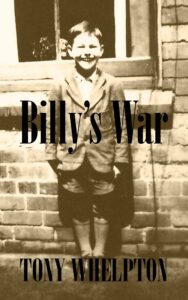
The idea for Tony Whelpton's most successful novel came to him after a dream
And suddenly in my mind the figure of a little boy emerged from the rubble, and Billy, the hero of my most successful novel so far, Billy’s War, was conceived. By lunchtime the following day, I printed out a 1,500 word synopsis of the entire novel. That is the essence of my creative process. It must have all been there in my mind already, I suppose, but it needs some catalyst to make it to emerge. I have never had quite that experience again, but most of my plots are based on things which are already within me, but buried.
A couple of years later I wrote a sequel to Billy’s War, called There’s No Pride in Prejudice, because I was fond of Billy, and I wanted to see what he would grow into, and these are the only two of my novels which are linked; the rest are stand-alone.
What happens to Billy? Well, he becomes a world-famous opera singer and devotes his life to fighting prejudice wherever he sees it; in other words he grows up into the man that I would like to have been!
Debbie: You started self-publishing fiction at the age of 79 – what was its appeal?
Essentially, because I felt that if I didn’t, my novel wouldn't even see the light of day, plus the realization that I could do it; the latter point is largely due to the enormous technological advances made recently, and which we have already started to take for granted.
Just imagine trying to publish a novel yourself 50 years ago – it simply wouldn't have been possible!
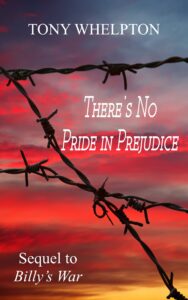
The sequel to “Billy's War” – the rest of Tony Whelpton's novels are stand-alone
I had no idea how to set about publishing a novel other than by submitting a manuscript to an agent who would perhaps sell the idea to a publisher. So I submitted, submitted, submitted… The result? A collection of rejection letters. And then a thought occurred to me: What agent would be enough of a lunatic to take on a man of my age? Agents need money to be able to live, after all!
Then one day one of my daughters bought me a Kindle for Christmas, and I became aware of e-books. At around the same time I saw something on the internet about POD, and, because I preferred the actual writing process to sitting around waiting for the postman to bring the latest rejection letter, I chose to publish it myself. The word indie had not yet started being used.
Debbie: How different was it to start publishing your own fiction rather than non-fiction – did you use the same processes or were new skills required?
Tony: In many ways it is far easier to prepare a novel for publication than, for example, a school textbook, largely because there are few illustrations in today’s novels. And then readers of novels are not deterred by a page, or several pages of uninterrupted print; but if you're creating a school textbook it has to be visually attractive enough to grab the child’s attention.
In my case there was a certain similarity, because most of my textbooks included little stories, anecdotes – of my own invention. But if you write something longer, the problems are not the same: you need to keep an eye on organisation, repetition, and consistency. Even so, I do believe that writing a novel is perhaps easier than writing a short story, and I would be absolutely terrified of writing a short story! It needs to be so concentrated, distilled, dramatic, with no digressions. In a novel you can get away with all sorts of things!
Debbie: What has been the biggest challenge of becoming an independent author for fiction?
Tony: I can't think of any challenges which arise as a result of being an independent author! I tend to think more of the freedoms that it gives me; but then I don’t use an editor, because I have done so much editing myself in the past.
I’ll just give one example of a freedom: when I was writing French textbooks for Longman, I had an editor who would not allow me to include the French expression for ‘washing the dishes’ unless the person carrying out that activity was a boy. Now since I knew very well that there are some women and girls who do wash the dishes, I was reluctant to write something which might suggest that the contrary was true. Consequently, although you will find faire la vaisselle in the exam syllabus, you will not find it any of my textbooks, which is ridiculous. But as an independent author/publisher, I can publish and be damned!
Debbie: What has been your biggest surprise about your new career as a novelist?
Tony: That people have actually bought my books and enjoyed them! Having said that, I think there are an awful lot of people today who want something for nothing, and who resent paying a reasonable price for something someone has put a lot of work into!
Debbie: If you could give your 79-year-old-self any advice that you've learned since you started self-publishing fiction, what would that be?
Tony: Marketing is important! It may be that, like me, you're not very good at it, aren’t very interested in it, but in that case you mustn’t expect to sell many books! Of course, if you don’t mind that, that’s fine – just don't expect any book, however good, do its own marketing!
Debbie: The calibre of your fiction is testifed by the fact that in 2017 you were invited as part of the prestigious Cheltenham Literature Festival to showcase one of your novels as part of its “Locally Sourced” initiative that celebrates local authors. How did you find that experience?
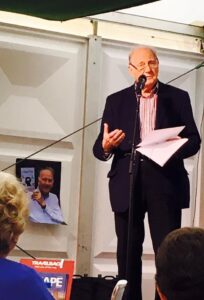
Tony Whelpton was delighted to be invited to read from his novel “A Change of Mind” at the Cheltenham Literature Festival
Tony: I was absolutely delighted, and I enjoyed the experience immensely. But of course, as a large part of my earlier career involved speaking to large audiences, it held no terrors for me at all.
Perhaps it should have done, because up to a couple of months before the Festival my speech was such that I could hardly hold a conversation! But the book I was introducing was A Change of Mind, a story which involves an old man who, earlier in his life, had been a university don, an MP, and a regular broadcaster, and he too had been laid low by the same affliction that hit me when I was about 82, an uncontrollable stammer, and the story involves his (and his wife’s) efforts to defeat it. As in my case, people who had known him years before, assumed that he must have had some sort of stroke, but neurologists were unable to find any evidence of this.
Perhaps it was because the fact of writing about something that I was suffering from had some sort of cathartic effect, I don't know… But I stood before roughly 100 people, reading to them, speaking to them, answering their questions, for half an hour, with a fluency which I would have been unable to achieve in a private conversation!
How did that happen? I don't know. I wish I did. And here I am suffering again, rather more severely than two years ago too, and in spite of that, I genuinely would love to be invited to do it again this year!
Debbie: We think your prolific output in your 80s is inspiring to authors of any age – but what would you say to others who are thinking of self-publishing in retirement?
Tony: Just do it! But don't ask someone else to do it for you – you need to be willing to learn new skills!
Don't believe anybody who says, ‘Write what you know’. If you don't know about something that you want to write about, find about about it!
In the world you are creating, the novelist is God! If you say something is true, then it is true – for your little, invented world – and if you believe that what you are doing is right, don't allow anyone to tell you you're wrong. (Even if you are!)
Debbie: What are your future writing and publishing plans?
Tony: I am currently working on a new novel, called At Dead of Night, which I intend to publish in late summer. After that, it depends how long I’ve got! I don't really want to retire, but obviously I can’t go on forever!
#Indieauthors everywhere will take inspiration from @TonyWhelpton1's remarkable story of #selfpublishing the first of his six (so far!) novels at the age of 79, detailed in our exclusive interview. Click To Tweet

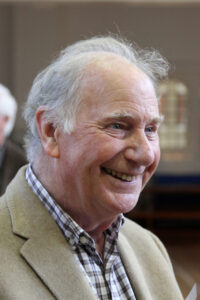

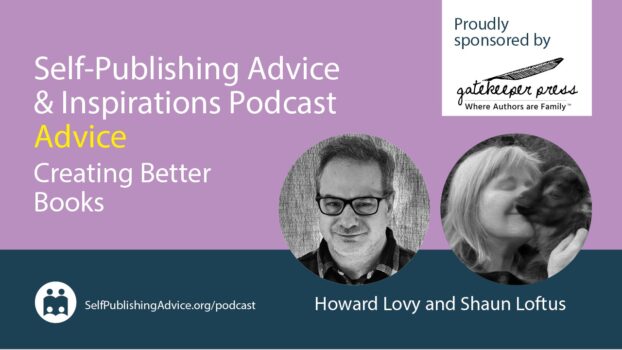

Tip of the hat to you, Mr. Whelpton!
Inspiring and remarkable!
I love what you said about marketing: “..don’t expect any book, however good, do its own marketing!”
Whorthwhile to keep in mind!
Thanks, Debbie!
Truly inspirational. Well done Tony!
Fantastic, and inspirational. I can relate. I was a lifelong nonfiction writer and editor, but didn’t turn my hand to writing fiction until my late fifties. Why? Mostly fear: I didn’t think I had the creativity to write characters, plots, and dialogue. But one troubling thought gnawed at me: that I would always wonder, on my deathbed, if I could ever have written a good novel, if I didn’t try?
Well, after losing my magazine editor position in 2008, I decided I had nothing to lose and no more excuses. So I started writing a thriller, “HUNTER,” and self-published it in 2011 — at age 62.
“HUNTER” soon rocketed up the bestseller lists. It became a Wall Street Journal “Top 10 Fiction Ebook,” and soared to #1 on Kindle among “Mysteries & Thrillers” and “Romantic Suspense,” and to #4 overall among all ebooks. It was a smash-hit debut for a successful thriller series; I’m now working on book #4.
Today, I look back and wonder “What might have been?” if only I had given it a shot when I was much, much younger. Mr. Whelpton is right: “Just do it.” Don’t let fear and excuses stop you. You’ll never know what might have been, unless you try.
I really enjoyed reading this interview.
Indeed it is important to believe in what you do and just do it.
It can be overwhelming at times but it was great to read this advice and learn about someone else’s experiences
Thank you
What an inspiring interview! The best advice Tony gives? ‘Just do it!’